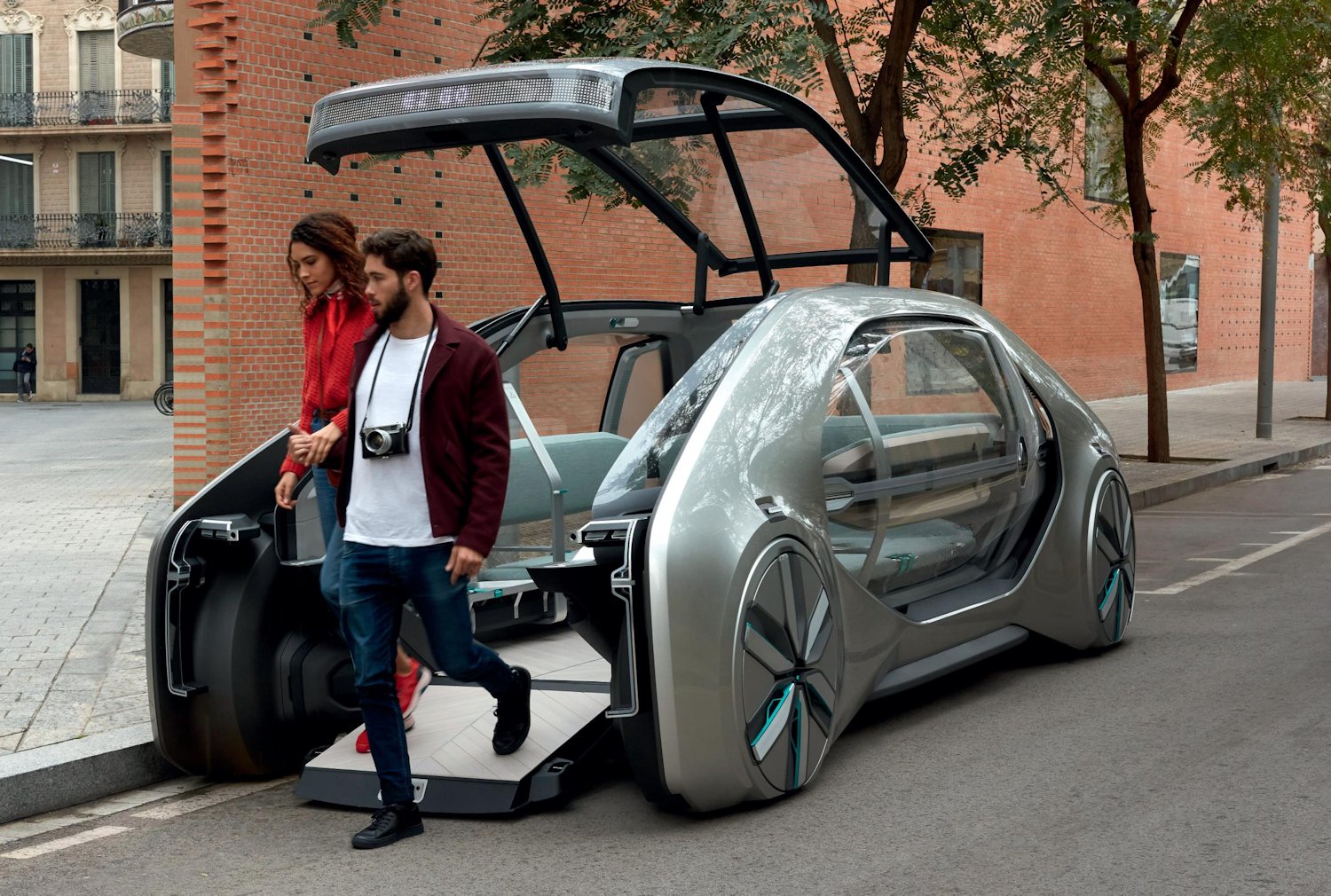
- Renault unveils its vision of shared urban mobility – the EZ-GO – at the Geneva Motor Show
- EZ-GO is built for the city and designed to be integrated within it
- EZ-GO is consistent with the Renault ‘Easy Life’ brand promise
- EZ-GO is a vision of the future and takes into account Groupe Renault’s Drive The Future 2017-2022 mid-term strategic plan
In 1898, when the world was just waking up to the thrill of the automobile, Louis Renault drove the first direct drive gearbox car up Rue Lepic, one of the steepest streets in Paris.
At the time 120 years ago, it was an unprecedented technical exploit. That moment sparked freedom, passion for driving and racing, and put Renault right at the centre of the transportation revolution.
At Renault our passion for driving, passion for sport, and passion to deliver people the freedom to enjoy an Easy Life while driving, inspires us every day.
Throughout this history, thanks to the innovative spirit inspired by its founder, Groupe Renault brands have been developing affordable vehicles to make their customers’ lives easier, while changing with the times.
A new era of transportation is beginning, heralding even more profound changes, both for people and automakers. Groupe Renault’s vision remains unchanged: to provide sustainable mobility for all, now and in the future. What does that mean? It means leadership in advancing zero emission vehicles, constantly reviewing trends and consumer needs, and bringing transportation solutions to all who want them – both owned, and shared. We believe our vision is even more relevant than ever, in view of the technological advances, user expectations, societal issues and regulatory constraints that are shaping the future of transportation. Our role in this new era is clear.
In urban areas – where it’s expected that 70 per cent of the population will live by 2050 – people are looking to improve the way they move from place to place: more efficient and less costly so they are free to travel without the lost time in congestion, looking for parking, etc. The demand for on-demand, shared mobility, complementary to individual cars, will appeal to more and more people, for convenience and also necessity – such as the young and the elderly who either cannot afford to have a car, or can’t drive.
The future of mobility is electric, connected and autonomous. People will choose whether they want to drive or be driven, with or without a driver on board; with vehicles that are more and more integrated into the surrounding environment, in cities that have become ‘smart’ through sensors, connectivity and other innovations are designed to make urban life more pleasant for people. Groupe Renault has been preparing for this for a long time, exploring new developments and working in an open innovation approach with partners in the ecosystem and our partners in the Alliance.
In the autumn of 2017, we presented our vision of the future for personal mobility with the SYMBIOZ Concept and the SYMBIOZ Demo car. In 2018, we are introducing our vision of the future for shared mobility with Renault EZ-GO.
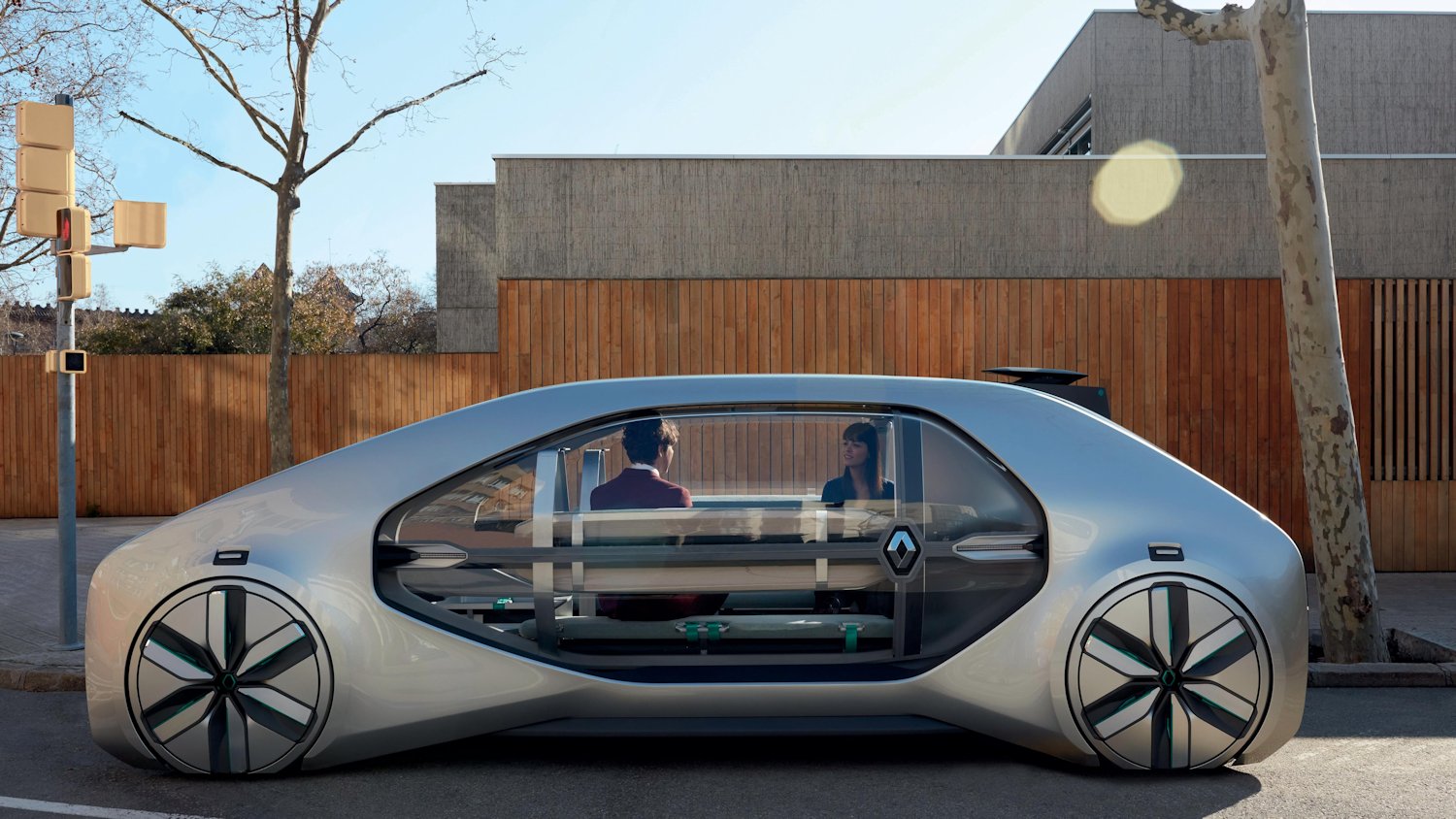
Renault EZ-GO at a glance
Built for the city and integrated within it, Renault EZ-GO is a car and a service. It’s consistent with the Renault Easy Life brand promise, providing an enjoyable and practical traveling experience:
- Renault EZ-GO could be ordered through an application or through physical stations;
- It has the comfort and privacy of an individual car while providing a hands-off, worry-free travel experience;
- Passengers can spend their traveling time reading, working, sleeping, etc;
- It’s affordable. As a shared service, Renault EZ-GO offers a highly competitive price/mile ratio;
- It’s meant for all. This robo-vehicle can be used by everyone: people who can no longer drive, people who cannot drive yet or who are unable to drive. It can be used for a ride alone, or with a group of friends, or with your family, or shared with other users.
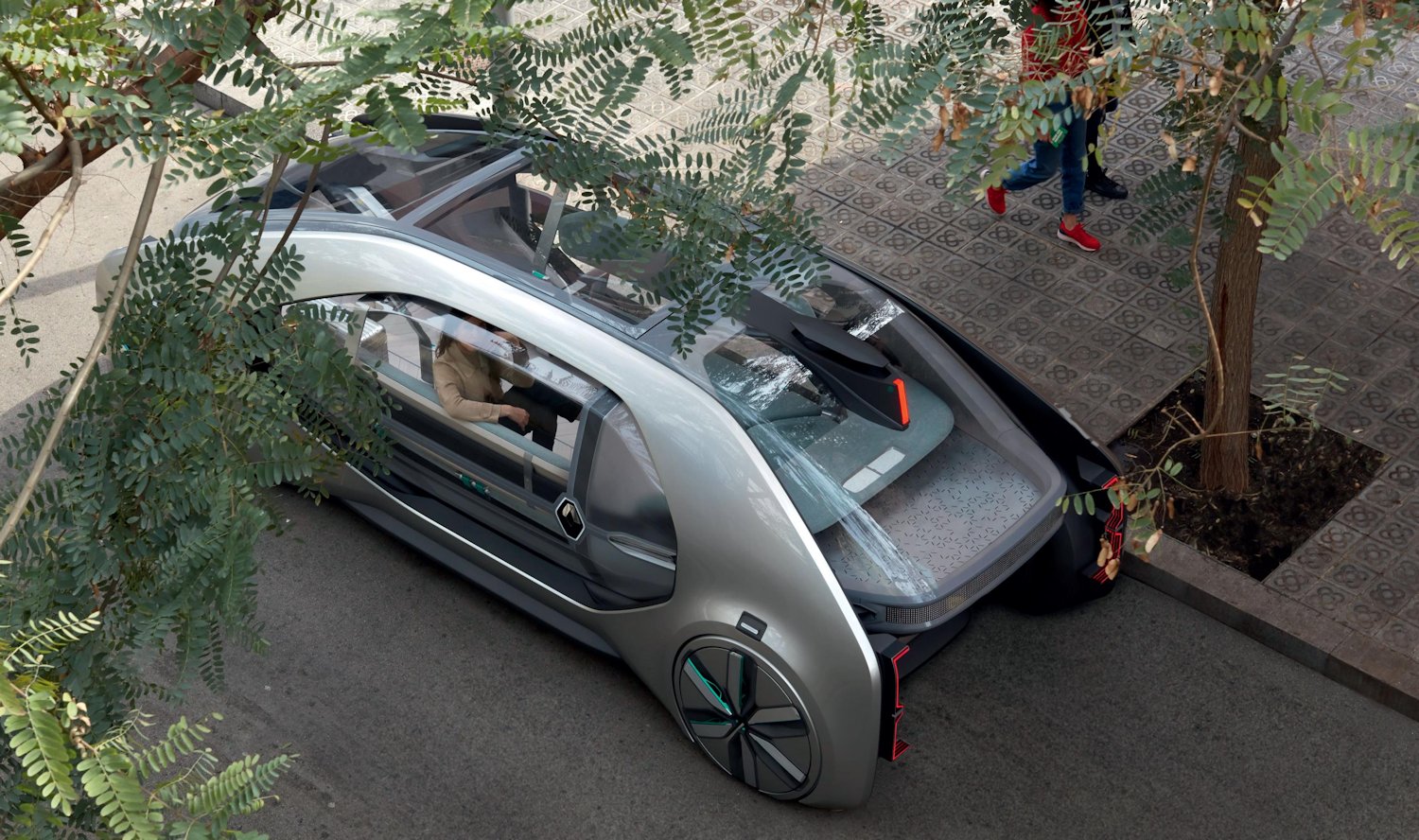
Reinventing cities to become smart cities
From Barcelona to Singapore, Stockholm to Paris and London to New York, urban planners are working to solve the growing problems that affect quality of life in cities. These solutions often come from new technologies, which make smart cities possible. Connected technologies, smart open data, the building blocks of the Internet of Things, smart networks, new materials and clean energy can all be used to invent and build a positive future.
Rudolf Giffinger, the urban and regional development analytical research expert at TU Wien sets his six criteria for a smart city:
- Smart economy: productivity and wealth creation are enhanced by a flexible, innovative ecosystem;
- Sustainable governance, with social and administrative services being better integrated;
- Smart housing, which underpins the citizens’ quality of life, aided by new technologies intended to reduce their ecological footprint;
- Eco-friendly citizenship, with the aim of creating a cosmopolitan social and cultural capital to stimulate the creativity and involvement of citizens in the city’s life;
- A sustainable environment, focusing on protecting natural habitats and cutting pollution;
- Smart mobility, which encourages new development opportunities through more efficient, eco-friendly, accessible and affordable mobility;
Groupe Renault’s work across the public sector to learn and to engage with cities about future vision, its leadership position for electric vehicles in Europe, and its commitment to continuing to invest in innovative new technologies, help us develop smart cities. For example:
- The Renault Energy Services subsidiary, whose role is to invest in projects related to smart electric grids by creating close bonds with various energy industry stakeholders. Renault Energy Services will focus mainly on the development of smart charging projects, vehicle-to-grid interactions between vehicles and the electricity grid, and second-life battery projects;
- The Z.E. app Smart Charge, already available in the Netherlands, makes charging smarter, simpler and cheaper by helping users make use of renewables and of the lowest prices;
- The development of the world-first smart island on Porto Santo – part of the Madeira archipelago – in partnership with EEM Empresa de Electricidade da Madeira, SA. This smart electric ecosystem is based on four key pillars: electric vehicles, stationary energy storage, smart charging and vehicle-to-grid (V2G) charging.
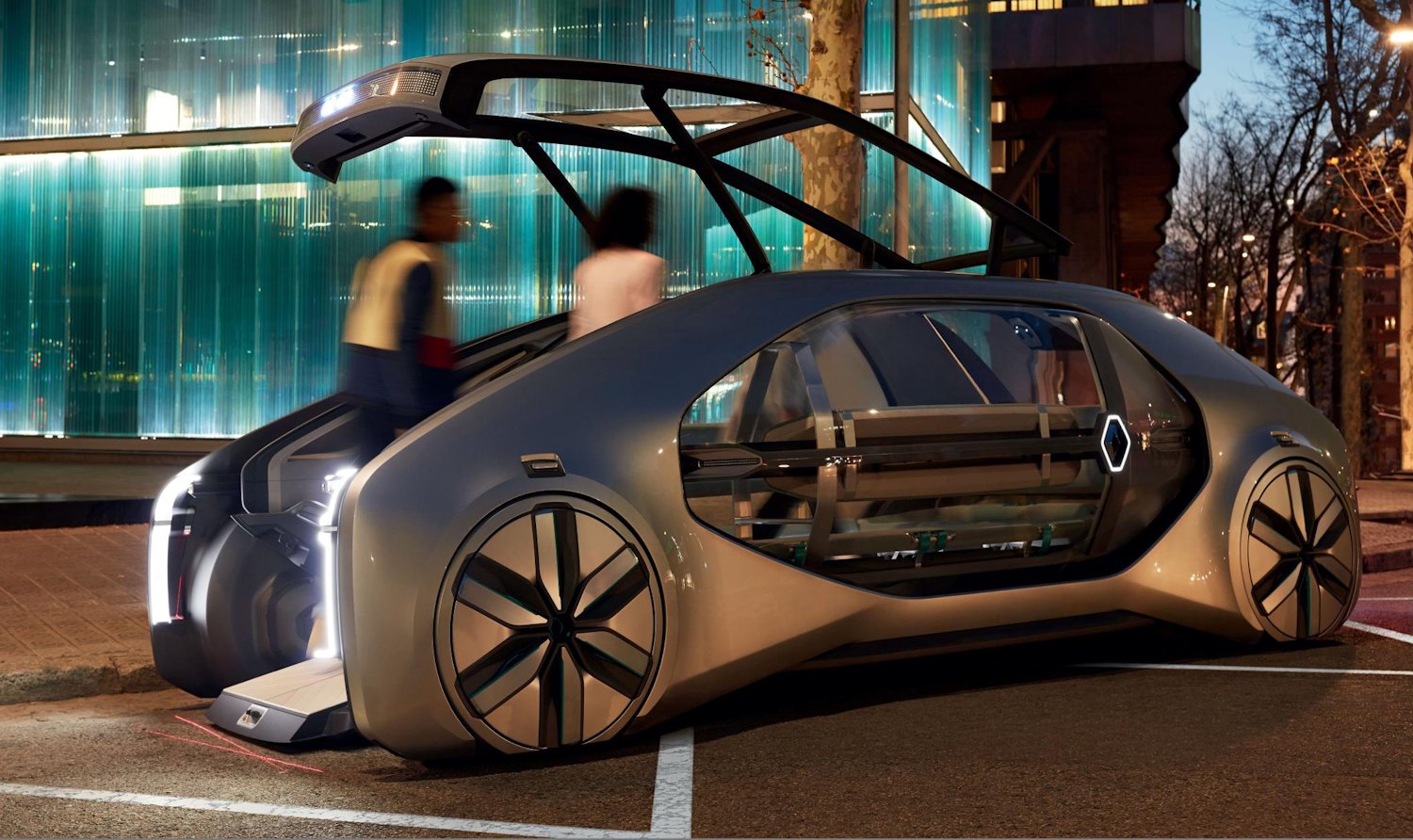
The Role of Renault EZ-GO
A vehicle and a service
Renault EZ-GO is a robo-vehicle – a shared, electric, driverless vehicle. Driving in town and the surrounding areas, it is designed to transport people – up to six passengers simultaneously. It is accompanied by a dedicated station, which blends in with the surrounding environment.
Renault EZ-GO is more than just a concept car. It’s both a vehicle and a service. It becomes part of the smart city ecosystems that are being developed by governments, municipalities and the private sector. Its modular platform allows other possible uses. You will see more later this year, as Renault EZ-GO is the first member of a family of concept cars to be introduced all through 2018.
In Renault’s life cycle design strategy ‘flower’, this family embodies the ‘Work’ petal.
On-demand mobility for all
Renault EZ-GO provides an on-demand mobility solution for all. It works through an instant-booking service from an app, or from in-town stations, depending on the preference of the operator.
The service may be operated by private or public organisations. It can potentially operate 24/7 and it supplements car ownership and mass transit such as subways and busses. It combines the flexibility and comfort of individual transport with the efficiency and the safety provided by public transport.
A dual role in cities
Renault EZ-GO represents Renault’s vision of a future on-demand mobility service that would be a genuine asset for any city, potentially even an iconic and recognizable design, representing its philosophy and commitment to providing sustainable, efficient mobility for everyone.
Over and above this symbolic aspect, Renault EZ-GO’s functional aspects give it a dual role in cities.
First, it simplifies travel for everyone, either as a stand-alone means of transport or as part of a multi-transport framework. Door-to-door or to/from a station. It will be affordable because it is a shared service. Making trips easier for users will help reduce stress and provide new personal and professional choices. Leisure and work activities will take the place of driving for the users.
Next, Renault EZ-GO has a positive impact on cities. In addition to encouraging shared mobility that by nature helps improve traffic flow and reduces the number of parking places needed, it is respectful, silent and pollution-free, thanks to its zero-emission design, smart grid systems, and intelligent second-life battery use. Renault EZ-GO’s trapeze shape, its limited height and large glazed surfaces make it a genuine window onto the city, less obvious than a conventional bus or shuttle. Lastly, Renault EZ-GO’s tree-lined stations blend beautifully into the cityscape. Its shallow angle makes it easy for people to get in with a suitcase on wheels, a stroller, a wheelchair, or even on crutches. Its benches are comfortable and made for lounging, without division between passengers; and its screens show useful information about the city that helps everyone, even those who don’t use Renault EZ-GO.
Safety is a priority
Statistics show that autonomous driving leads to a significant decrease in the number of accidents. Renault EZ-GO has level 4 autonomous driving capability on the SAE International* 5-level scale. This means the vehicle is able to manage its distance from the vehicle in front, stay in lane, change lanes (e.g. when overtaking) and turn all by itself at a junction. It can also move into a safe position in cases of exceptional incidents in its vicinity, either by itself or through its connectivity with a monitoring centre – a technology currently being developed under the Alliance’s umbrella.
Compared to a conventional or ‘shuttle’ type of vehicle, Renault EZ-GO actively bolsters its users’ safety thanks to its limited speed (30 mph), its wide front opening is safe and away from the road for passengers when getting in and out, and the light marking the ground outside to indicate where the platform will land.
Safety is also increased for the city’s other users and persons near the vehicle, thanks to the light signature that shows it’s in autonomous mode, the messages on the light strips (e.g. showing arrows to pedestrians when they can cross the road) and the outside sounds that signal its presence to pedestrians and cyclists.
* A US-based international organisation specializing in the transport industry and standards.
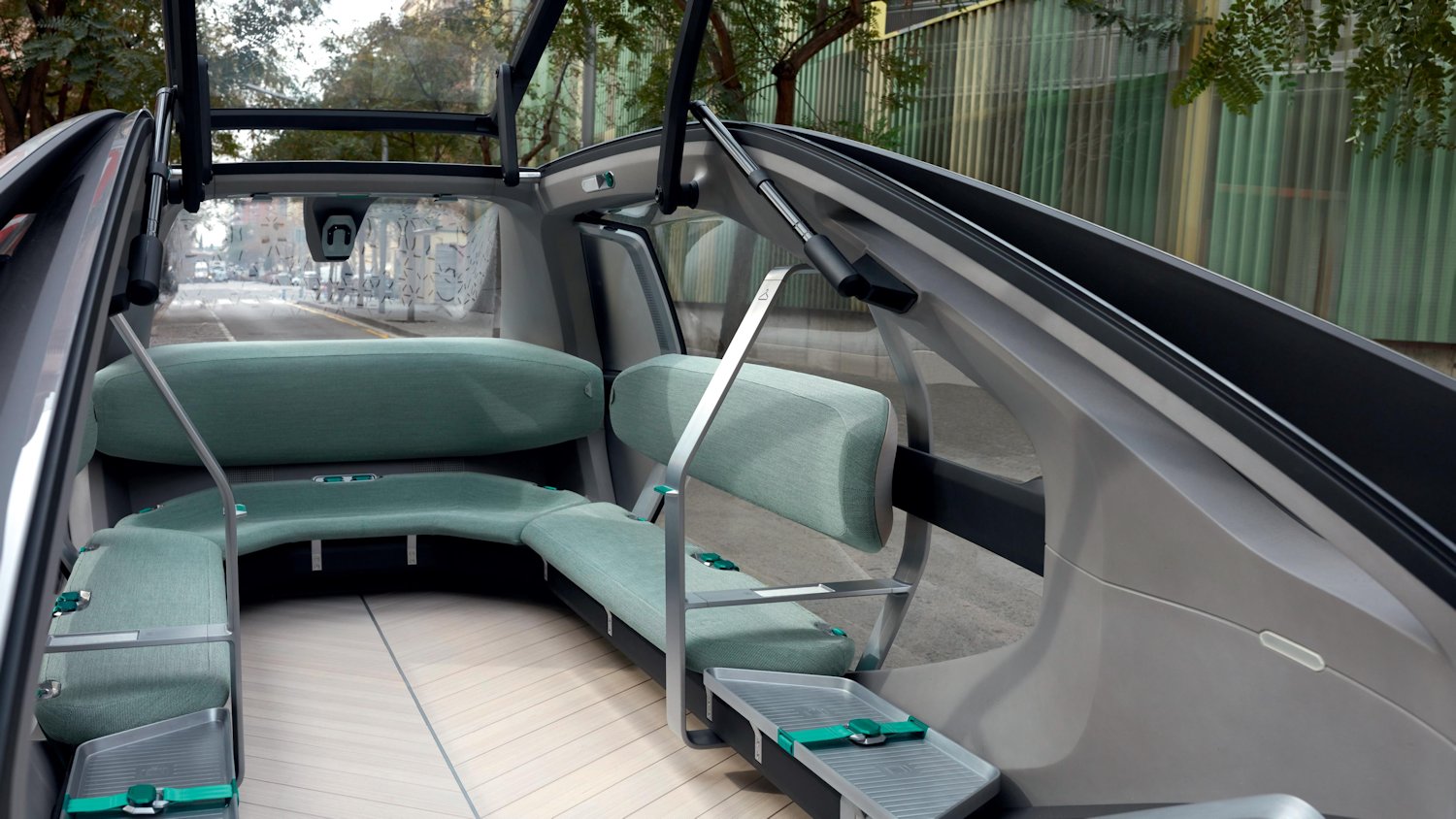
Uses and users of Renault EZ-GO
One vehicle, many users
With Renault EZ-GO’s innovative architecture and cocoon-like styling, Renault is the first automaker to design a robo-vehicle that is meant to be beautiful, far from a cube-shaped shuttle. The characteristics of this concept mean all types of users can use it, in many ways and under various conditions, in keeping with the “Easy Life” approach that is in Renault’s DNA:
- A working space that opens out onto the city;
- Driving people who can’t themselves;
- A safe trip for vulnerable people;
- Privatise the journey and choose with whom we travel;
- Easy ingress and egress;
- Prams and babies are welcome on board;
- Easier access for persons with reduced mobility;
- 1–6 persons on board;
- Private-group trips;
- Discovering the city;
- Getting aboard anywhere on the city;
- Sitting safely;
- Booking from the station;
- A station for all to use, built right into the city.
A new, connected and personalised life experience on board
The Renault EZ-GO experience begins when getting on board. No straining required, you just get in while standing upright, through the innovative front door. The small platform adjusts to its environment by lowering to the level of the roadway or of the station’s access ramp.
Once inside, passengers can enjoy an open space for discussions, with sofa-type seating in a semicircle for more conviviality. You can choose where you want to sit when booking. Once everybody is settled in and any luggage fastened in the reserved spots, just push the button to tell the vehicle that it can start again.
With the onboard Wi-Fi connectivity, users have a continuous direct access to their digital lives. They can charge their smartphones by induction. There’s a large screen in front of the door for sharing trip information (time to arrival, planned stops for boarding or leaving, etc.), or information about the city’s services, with the passengers. For example, Renault EZ-GO can display information about a tourist spot as it travels close by. Last year, Renault showed this vehicle-to-infrastructure connectivity technology (V2X) in the autonomous prototype SYMBIOZ Demo car.
The station’s screens show cultural and tourist information about the city and lets you book trips spanning several means of transport, and tickets to museums at your destination. Many content options could be possible, depending on the usage scenario.
Choose when booking
In addition to your seat on board, booking a trip with the EZ-GO app on your smartphone, or from the station screen lets you customize your experience in various ways. People who want to use the service get a choice of several vehicles, each with a different type of passengers who can board it. For example, six tourists who want the whole vehicle to themselves and have a guided discovery tour of the city.
Renault EZ-GO – design and technical elements
EXTERIOR
Design
Renault EZ-GO’s trapeze-shaped design helps it fit into the city. It was designed to provide the widest possible field of vision for the autonomous system’s sensors and for bringing in light from above through the glass panorama roof. The vehicle’s limited height ensures it doesn’t spoil outside pedestrians’ views of the city.
Aerodynamics
Renault EZ-GO’s aerodynamics are integral to the vehicle’s smooth design and aesthetics. It also protects the wheels and suspension, among others, so the vehicles require less maintenance and cleaning. It also projects less dirt around it, for the well-being of the city’s users.
Windows
Renault EZ-GO has a vast glazed area curved outward on the sides and all along the roof, giving passengers an unobstructed view of their trip, opening right out onto the city.
Electric platform
Renault EZ-GO is built on a platform specifically designed for its electric motor, which is located on the rear axle to maximize interior comfort. The motor drives the rear wheels and the batteries are located under the floor.
4CONTROL
Renault EZ-GO features a 4CONTROL chassis with 4-wheel steering for improved agility and safety in the city.
Active suspension
When stopped, Renault EZ-GO has a low-profile silhouette. When on the move, the active suspension raises the vehicle by several centimetres, to go over speed bumps more easily for example.
Built in indicators
The indicator repeaters perfectly follow the curve of the wheel fairing, and turn with them, improving visibility for the other road users.
Charging
Renault EZ-GO has a wireless induction battery charging system, for automatic connection without human intervention.
Control tower
All the sensors required for autonomous driving (radars, lidars, ultrasound, cameras) are grouped in the removable antenna located on the roof’s rear spoiler. It is automatically deployed when the vehicle starts.
These sensors are the same used in a personal autonomous vehicle but some settings are tailored for travelling in the city rather than on the highway, e.g. to provide a broader field of vision around the vehicle.
Brake light
The rear spoiler also features Renault EZ-GO’s third brake light, suspended in its edge, in the same way as SYMBIOZ Concept’s one.
Light strips
Renault EZ-GO’s front (white) and red (rear) light strips function as welcome sequence and indicators for passengers and pedestrians for example signaling with arrows that it is safe to cross.
INTERIOR
Station
Once connected to its station, Renault EZ-GO features a large flat floor prolonging the ramp to help with boarding and settling in.
Interior
With no driver’s seat, the long wheelbase and electric platform with underfloor batteries provide maximum cabin space for the passengers.
Conviviality
The seats are arranged as a U-shape sofa for a more welcoming setting. Hardwearing and warm materials are designed for intense and varied uses.
Brightness
The seat backs are deliberately kept separate from the seats, which are suspended, to maximize the amount of light around the passengers.
Roof
There is an all-glass roof above the passengers. When the light gets too strong, it automatically goes darker.
Floor
The floor is covered in herringbone-patterned sustainable wood, both solid and durable. A LED light strip crosses the floor to guide the passengers to the exit.
Screen
The large screen located in front of the door is for exchanging information between Renault EZ-GO and its passengers. Among others, it displays trip information: time to arrival, planned stops for getting off or on, etc.
Charger
Induction chargers are available for the passengers’ smartphones
Luggage
Passenger’s luggage can be fastened in reserved areas.
Technical datasheet: Renault EZ-GO and its station in figures
- Length: 5.20 m
- Width: 2.20 m
- Height (hatch closed): 1.60 m
- Height (hatch open): 1.80 m
- Wheelbase: 3.80 m
- Weight: 1,700 kg (including 300 kg for the batteries)
- Engine: 1 electric motor
- Drive wheels: REAR
- Steering wheels: FRONT/REAR
- Autonomous technology: level 4
- Number of seats: 6
- Station length: 7.50 m
- Station width: 3 m
- Station height: 1 m
- Ramp length: 6 m
- Ramp width: 1.4 m
- Ramp angle: 6°
Renault EZ-GO, what’s next?
Renault EZ-GO is a vision of the future. We are already in progress on several business-to-business and business-to-consumer scenarios for new mobility services. Groupe Renault plans to launch its ride-hailing robo-taxi commercial services by the end of the Drive The Future 2017-2022 strategic plan, in cooperation with the Alliance. We will develop robo-vehicles which we will operate, enabling us to sell on-demand mobility services.
Drawing on a breadth of resources across the Alliance we aim to develop the technology building blocks required to deploy and operate such services in a variety of scenarios.
Renault will also work with ecosystem partners through an open innovation approach, involving large companies, start-ups and the public sector. Our Open Innovation Labs in Silicon Valley, Tel Aviv and Paris are working with the most promising start-ups and other partners to stay ahead of changes in the industry, regulations, deeply understand trends and take advantage of new opportunities to develop offerings for customers.
Renault will continue to explore mobility solutions at a local level too, taking into account local variables, including many it is testing and marketing, today:
- The Renault Mobility 24/7 self-serve rent-a-car app for individuals and businesses.
- Madrid’s Zity electric car sharing service (500 ZOE), working with Ferrovial.
- The Karhoo integrated on-demand taxi and ride-hailing service booking platform, with over 150,000 vehicles in Belgium, France, Germany, Ireland, the Netherlands, Spain and the United Kingdom. Platform users can book, modify, monitor and pay for their rides.
- The Marcel ride-hailing service, operating in Paris and the Greater Paris area, which features 24/7 vehicle booking and hailing.
At the same time, Groupe Renault will continue its research on and full-size trials of on-demand autonomous mobility services through its FOTs (Field Operational Tests).
- The EVAPS (Écomobilité par véhicules autonomes sur le territoire de Paris-Saclay [Eco-friendly mobility with autonomous vehicles on the grounds of Paris-Saclay]) autonomous mobility service, based on ZOE, running at Saclay, jointly with Transdev and other contributors such as Vedecom, SystemX and the University of Paris-Saclay through the Paris Open Innovation Lab.
- The Rouen Normandy Autonomous Lab, Europe’s first experimental on-demand mobility service using autonomous electric vehicles (ZOE and others) on public roads, in partnership with Métropole Rouen Normandie, the Normandie Region, Transdev, Caisse des Dépôts and Group Matmut.
In the next years, these tests will be opened up in order to benefit more users, until the commercial launch of such a service.
